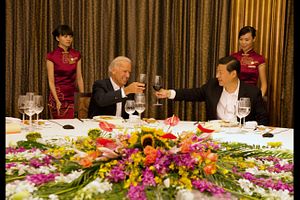On February 10, three weeks after U.S. President Joe Biden took office, he had his first phone call with Chinese President Xi Jinping. The call took place just ahead of China’s Lunar New Year holiday and the leaders apparently started their conversations wishing each other well in the coming Year of the Ox.
According to the White House read-out, Biden mentioned “preserving a free and open Indo-Pacific” among his priorities, a clear signal that the Trump-era formulation is here to stay. Biden then launched into a litany of complaints that were also frequently spoken of by Trump administration officials: “President Biden underscored his fundamental concerns about Beijing’s coercive and unfair economic practices, crackdown in Hong Kong, human rights abuses in Xinjiang, and increasingly assertive actions in the region, including toward Taiwan.”
However, one notable difference between the administrations was that Biden left the door open for what he called “practical, results-oriented engagements when it advances the interests of the American people and those of our allies.” In particular, the White House said Biden had discussed with Xi “views on countering the COVID-19 pandemic, and the shared challenges of global health security, climate change, and preventing weapons proliferation,” laying out some possible areas of cooperation. Even here, though, major differences remain – for example, the Biden administration has remained outspoken about China’s lack of transparency on COVID-19.
According to the readout from the Chinese Foreign Ministry, Xi placed much more emphasis on the need to return to cooperation. “You have said that America can be defined in one word: Possibilities. We hope the possibilities will now point toward an improvement of China-U.S. relations,” Xi told Biden, according to the only direct quote from the readout. The statement also paraphrased Xi as saying, “When China and the United States work together, they can accomplish a great deal for the good of both countries and the world at large; confrontation between the two countries, however, will definitely be disastrous for both countries and the world.”
“Xi emphasized that while the two sides may differ on some issues, it is crucial to show mutual respect, treat each other as equals, and properly manage and handle the differences in a constructive fashion,” the statement continued. While this is far more polite language than is sometimes used by Chinese officials, the upshot is the same: The United States needs to be more deferential to China. Beijing believes it already shows enough “respect” to Washington, but has long complained that the U.S. doesn’t return the favor. Handling differences in a “constructive fashion” is also China’s diplomatic way of telling other countries to drop their criticisms.
Xi signaled that on some of the issues Biden mentioned, China was not going to budge. “The Taiwan question and issues relating to Hong Kong, Xinjiang, etc. are China’s internal affairs and concern China’s sovereignty and territorial integrity, and the U.S. side should respect China’s core interests and act prudently,” the statement said.
The Chinese leader did make one concrete proposal in the conversation: Xi called for China and the U.S. to “re-establish the various dialogue mechanisms” between them. The previous Bush and Obama administrations held regular ministerial exchanges with China, first the Strategic Economic Dialogue, later expanded to the Strategic and Economic Dialogue in 2009. The Trump administration originally set up four separate talks with China: the Diplomatic and Security Dialogue, the Comprehensive Economic Dialogue, the Law Enforcement and Cybersecurity Dialogue, and the Social and Cultural Dialogue. Each dialogue met once in 2017 – and that was it. Xi clearly wants to restart talks, likely in yet another reconfigured format. That would be a small step toward more normalized relations, if it happens.
Overall, the Chinese Foreign Ministry readout was less focused on the negatives, likely in keeping with the stated desire for the call to “send a positive signal to the world.” But while the White House’s summary was pessimistic, it was actually an improvement on a previous call between Secretary of State Antony Blinken and Yang Jiechi, the director of China’s Central Commission for Foreign Affairs (and China’s top diplomat, outranking Foreign Minister Wang Yi). The State Department readout of that call made no mention of areas for cooperation, and instead added in a promise that the “United States will work together with its allies and partners in defense of our shared values and interests to hold the PRC accountable for its efforts to threaten stability in the Indo-Pacific.”

































